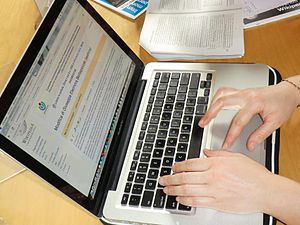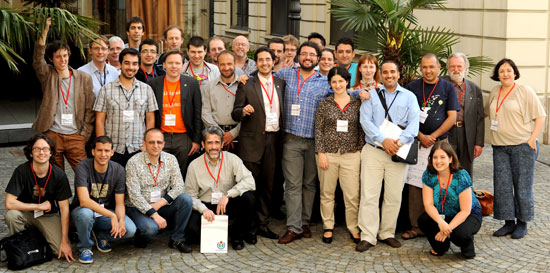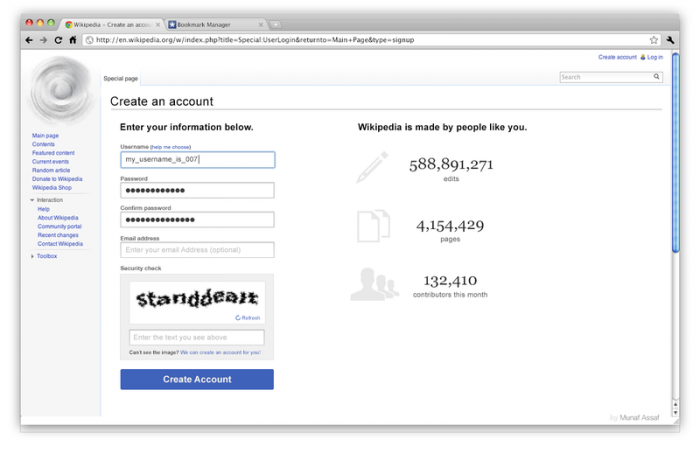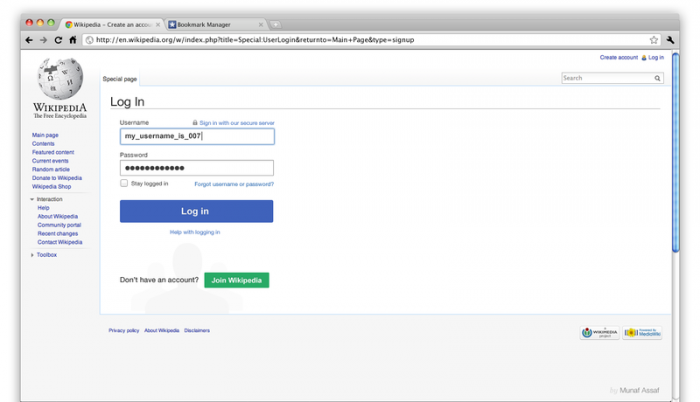English
What happens when a WikiWoman meets a WikiLibrarian? An editathon on women’s biographies, of course! Or at least this is what happened on May 4th at Biblioteca Salaborsa, one of the most well-known libraries in Bologna, Italy.
Wikimedia Italia organized its first event at Biblioteca Salaborsa on April 20th, an introductory workshop led by wikipedian Piero Grandesso. Thanks to the work of the librarian and wikimedian Virginia Gentilini, it was possible to renew the collaboration and organize a second event.
We had thirteen participants, some of whom came after attending the first workshop. We created five new articles and improved two existing pages, paying homage in this way to seven amazing Italian women (and also a French one!) who didn’t have the space they deserved on Wikipedia.
It is always a little shocking to discover how many relevant women are missing from Wikipedia. Amongst the pages we created was one about Hortensia, a late Roman Republic orator and one of the very few women who at that time challenged men’s authority by giving a speech in the Forum. She lived during the civil war that took place after Julius Caesar’s assasination, a period when the Roman Republic was struggling with many war expenses. Hortensia debated in the Roman Forum against a tax imposed on wealthy Roman women, arguing that it was not legitimate to demand that women’s properties finance a war in which they had no active role. Eventually the number of women affected by the tax was reduced.
As one can imagine, we study a lot of Ancient Roman history in Italy. Latin literature and language are also compulsory teachings in some secondary schools. But Hortensia’s page, already in other language versions, was not yet on Italian Wikipedia.
Beside the creation of content on Wikipedia, the editathon was also an occasion to put together and share the different skills and competencies of the organizers. The team was composed of Virginia Gentilini, Wikimedia Italia member Ginevra Sanvitale and Commons and Italian Wikipedia sysop Elitre, who worked together, each one according to her area of expertise. We also had a chance to learn and confront a number of related Wikimedia topics.
Finally, the role played by Salaborsa as a center of cultural creation and knowledge circulation was very important.
In 2012, Wikimedia Italia reached out to Italian librarians and libraries for the first time, discovering many possible ways of collaboration. Wikipedia workshops for patrons of libraries are one of these, and they are particularly interesting because of their cultural and social implications. Working on Wikipedia in libraries can bridge the gap between print, traditional resources of information and the lively and active community of Wikipedians. But it can contribute to bridge the Wikipedia Gender Gap too: public libraries in Italy are traditionally used by women more than men, and they can therefore be a perfect place to find women interested in connecting their love of reading to a more participative and empowering way to enrich their cultural life. More women attended the editathon indeed, showing enthusiam and asking for further opportunities to work in this direction.
Librarians in Italy are traditionally mostly women too. It will be interesting to see how many successful ways of collaboration we’ll manage to find, both working directly with patrons inside the libraries, and at a more general level of interaction between bibliographic data held by National Libraries and Wiki Projects. There is such a large amount of useful work to do!
Ginevra Sanvitale, Wikimedia Italia. With the collaboration of Virginia Gentilini
Italian
Cosa succede quando una Wikipediana incontra una WikiBibliotecaria? Un editathon su biografie femminili, ovviamente! O per lo meno questo è quello che è successo il 4 maggio in Biblioteca Salaborsa, una delle biblioteche più famose di Bologna.
Wikimedia Italia ha organizzato il suo primo evento in Salaborsa il 20 aprile, un workshop introduttivo tenuto dal wikipediano Piero Grandesso. Grazie al lavoro della bibliotecaria e wikimediana Virginia Gentilini è stato possibile rinnovare la collaborazione e organizzare un secondo evento.
Abbiamo avuto tredici partecipanti, alcuni dei quali arrivati direttamente dal primo workshop. Abbiamo creato cinque nuovi articoli e migliorato due pagine esistenti, omaggiando in questo modo sette fantastiche donne italiane (e anche una francese!) che non avevano ancora lo spazio che meritavano su Wikipedia.
È sempre un po’ scioccante scoprire quante donne rilevanti mancano su Wikipedia. Tra le pagine che abbiamo creato ce n’è una su Ortensia, un’oratrice della tarda Repubblica romana e una delle pochissime donne che a quei tempi sfidarono l’autorità maschile tenendo un discorso nel Foro. Ortensia visse durante la guerra civile iniziata dopo l’assassinio di Giulio Cesare, un periodo di grandi spese militari per Roma. Ortensia discusse nel Foro contro una tassa imposta sulle romani benestanti, sostenendo che non fosse legittimo chiedere alle donne romane di impegnare i loro patrimoni per una guerra in cui non avevano avuto un ruolo attivo. Alla fine, il numero di donne colpite dalla tassa fu diminuito.
In Italia studiamo tanta storia romana. Basti pensare che la lingua e la letteratura latina sono ancora materie obbligatorie in diverse scuole superiori. Eppure la pagina di Ortensia, già esistente in altre versioni linguistiche, non era ancora presente su Wikipedia in italiano.
Oltre alla creazione di contenuti su Wikipedia, l’editathon è stato anche un’occasione di mettere insieme e condividere le diverse abilità e competenze delle organizzatrici. Il team era composto da Virginia, Ginevra Sanvitale di Wikimedia Italia e l’amministratrice di Commons e Wikipedia in italiano Elitre, che hanno lavorato insieme ognuna in accordo al proprio campo di esperienza. Abbiamo anche avuto la chance di approfondire le nostre conoscenze e scambiarci opinioni su diversi argomenti collegati al mondo Wikimedia.
Infine, il ruolo giocato da Salaborsa in quanto centro di creazione culturale e di circolazione della conoscenza è stato molto importante.
Nel 2012 Wikimedia Italia ha per la prima volta iniziato a dialogare con le biblioteche e i bibliotecari italiani, scoprendo molti modi possibili per collaborare. Uno di questi sono i workshop su Wikipedia fatti per gli utenti delle biblioteche, particolarmente interessanti per le impicazioni culturali e sociali che comportano. Lavorare con Wikipedia nelle biblioteche può ridurre il divario tra la carta stampata, le risorse d’informazione tradizionali e la vivace e attiva comunità di Wikipediani. E inoltre può anche contribuire a ridurre il divario di genere: le biblioteche pubbliche italiane sono tradizionalmente utilizzate dalle donne più che dagli uomini e possono dunque essere il luogo perfetto per trovare donne interessate a collegare il loro amore per la lettura a una modalità maggiormente partecipativa e responsabilizzante di arricchimento della loro vita culturale. Molte donne, infatti, hanno partecipato all’editathon, mostrando entusiasmo e chiedendo altre occasioni di lavoro in questa direzione.
Gli stessi bibliotecari in Italia sono, tradizionalmente, per la maggior parte donne. Sarà interessante vedere quanti altri modi riusciremo a trovare per collaborare, sia lavorando direttamente con gli utenti all’interno delle biblioteche, sia a un livello di interazione più generale tra i dati bibliografici custoditi dalle biblioteche nazionali e i progetti Wiki. C’è così tanto lavoro utile da fare!
Ginevra Sanvitale, Wikimedia Italia. Con la collaborazione di Virginia Gentilini
Spanish
¿Qué sucede cuando WikiWomen se junta con una Wikibiblitecaria? Un editatón de biografías de mujeres, por supuesto! O al menos esto es lo que sucedió el 4 de mayo en la Biblioteca Salaborsa, una de las bibliotecas más conocidas en Bolonia, Italia.
Wikimedia Italia organizó su primer evento en la Biblioteca Salaborsa el 20 de abril, un taller de introducción realizado por el wikipedista Piero Grandesso. Gracias a la labor de la bibliotecaria y wikimedista Virginia Gentilini, se logró renovar la colaboración y organizar un segundo evento.
Teníamos trece participantes, algunos de los cuales vinieron después de asistir al primer taller. Hemos creado cinco nuevos artículos y mejoramos dos páginas existentes, rindiendo homenaje de esta manera a siete mujeres italianas increíbles (y también una francesa!) Que no tenían el espacio que merecen en Wikipedia.
Siempre es algo impactante descubrir cuántas mujeres relevantes no están en Wikipedia. Entre las páginas que hemos creado había un sobre Hortensia, una oradora de la república romana tardía y una de las pocas mujeres que en ese momento desafiaron la autoridad de los hombres, dando un discurso en el Foro. Ella vivió durante la guerra civil que tuvo lugar después del asesinato de Julio César, un período en que la República Romana estaba luchando contra las consecuencias económicas de la guerra. Hortensia debatió en el Foro Romano en contra de un impuesto aplicado a las mujeres romanas adineradas, con el argumento de que no era legítimo exigir que las mujeres financiaran con su propiedad una guerra en la que no tenían ningún papel activo. Eventualmente se redujo el número de mujeres afectadas por el impuesto.
Como se puede imaginar, estudiamos mucho de la historia antigua de Roma en Italia. La literatura y la lengua latina también son materias obligatorias en algunas escuelas secundarias. Pero la página de Hortensia, que ya existía en otros idiomas, todavía faltaba en la Wikipedia en italiano.
Además de la creación de contenidos en Wikipedia, el editatón fue también una ocasión para reunir y compartir las diferentes experiencias y habilidades de los organizadores. El equipo estaba compuesto por Virginia, la integrante de Wikimedia Italia Ginevra Sanvitale y el administrador de Commons y Wikipedia en italiano Elitre, quienes trabajaron juntos, cada uno de acuerdo a su área de especialización. También tuvimos la oportunidad de aprender y hacer frente a una serie de temas relacionados con Wikimedia.
Por último, el papel desempeñado por Salaborsa como centro de creación cultural y difusión del conocimiento fue muy importante.
En 2012 Wikimedia Italia se dirigió a los bibliotecarios y las bibliotecas italianas por primera vez, descubriendo muchas formas posibles de colaboración. Talleres de Wikipedia para usuarios de las bibliotecas son una de ellas, particularmente interesantes debido a sus implicaciones culturales y sociales. Trabajar con Wikipedia en las bibliotecas puede cerrar la brecha entre los recursos tradicionales de información impresos y la comunidad viva y activa de wikipedistas. Pero también puede contribuir a reducir la brecha de género en Wikipedia: las bibliotecas públicas en Italia se utilizan tradicionalmente más por mujeres que por hombres, y por lo tanto pueden ser el lugar perfecto para encontrar mujeres interesadas en conectar su amor por la lectura con una manera más participativa y de empoderamiento para enriquecer su vida cultural. La mayoría de las mujeres que asistieron a la editatón de hecho, mostraron su entusiasmo y preguntaron acerca de las oportunidades de continuar trabajando en esta dirección.
La mayoría de bibliotecarios en Italia también son tradicionalmente mujeres. Será interesante ver cuántas formas exitosas de colaboración podemos encontrar, tanto trabajando de manera directa con los usuarios dentro de las bibliotecas, y en un nivel más general a través de la interacción entre los datos bibliográficos contenidos en las bibliotecas nacionales y en los proyectos wiki. Hay tanto trabajo útil que hacer!
Ginevra Sanvitale, Wikimedia Italia. Con la colaboración de Virginia Gentilini





































![By Zev Rothkoff [CC-BY-SA-3.0 (www.creativecommons.org/licenses/by-sa/3.0)], via Wikimedia Commons 1st place: The Tower of David in Jerusalem](http://web.archive.org./web/20130515012102im_/http://upload.wikimedia.org/wikipedia/commons/thumb/0/0e/%D7%9E%D7%92%D7%93%D7%9C_%D7%93%D7%95%D7%93_%D7%91%D7%A9%D7%9C%D7%92_1992.jpg/640px-%D7%9E%D7%92%D7%93%D7%9C_%D7%93%D7%95%D7%93_%D7%91%D7%A9%D7%9C%D7%92_1992.jpg)
![By Nitzan Zehavi [CC-BY-SA-3.0 (www.creativecommons.org/licenses/by-sa/3.0)], via Wikimedia Commons 2nd place: The Waldheim in Evangelical Church in Alonei Abba](http://web.archive.org./web/20130515012102im_/http://upload.wikimedia.org/wikipedia/commons/thumb/e/e7/%D7%94%D7%9B%D7%A0%D7%A1%D7%99%D7%99%D7%94_%D7%94%D7%90%D7%95%D7%95%D7%A0%D7%92%D7%9C%D7%99%D7%AA_%D7%91%D7%90%D7%9C%D7%95%D7%A0%D7%99_%D7%90%D7%91%D7%90.jpg/640px-%D7%94%D7%9B%D7%A0%D7%A1%D7%99%D7%99%D7%94_%D7%94%D7%90%D7%95%D7%95%D7%A0%D7%92%D7%9C%D7%99%D7%AA_%D7%91%D7%90%D7%9C%D7%95%D7%A0%D7%99_%D7%90%D7%91%D7%90.jpg)
![By Ilan Arad [CC-BY-SA-3.0 (www.creativecommons.org/licenses/by-sa/3.0)], via Wikimedia Commons 3rd place: Ma'ale Akrabim (Scorpions Pass)](http://web.archive.org./web/20130515012102im_/http://upload.wikimedia.org/wikipedia/commons/thumb/a/ab/Ma%27aleh_Akrabim.jpg/640px-Ma%27aleh_Akrabim.jpg)
![By Estherab [CC-BY-SA-3.0 (www.creativecommons.org/licenses/by-sa/3.0)], via Wikimedia Commons Mahmood Mosque, Kababir, Haifa](http://web.archive.org./web/20130515012102im_/http://upload.wikimedia.org/wikipedia/commons/thumb/4/4d/2_%D7%9E%D7%A1%D7%92%D7%93_%D7%A1%D7%99%D7%99%D7%93%D7%A0%D7%90_%D7%9E%D7%97%D7%9E%D7%95%D7%93_%D7%91%D7%A9%D7%9B%D7%95%D7%A0%D7%AA_%D7%9B%D7%91%D7%91%D7%99%D7%A8_%D7%91%D7%97%D7%99%D7%A4%D7%94_%D7%A4%D7%A0%D7%99%D7%9D.jpg/640px-2_%D7%9E%D7%A1%D7%92%D7%93_%D7%A1%D7%99%D7%99%D7%93%D7%A0%D7%90_%D7%9E%D7%97%D7%9E%D7%95%D7%93_%D7%91%D7%A9%D7%9B%D7%95%D7%A0%D7%AA_%D7%9B%D7%91%D7%91%D7%99%D7%A8_%D7%91%D7%97%D7%99%D7%A4%D7%94_%D7%A4%D7%A0%D7%99%D7%9D.jpg)
![By Daniel Winter [CC-BY-SA-3.0 (www.creativecommons.org/licenses/by-sa/3.0)], via Wikimedia Commons Reading Power Station in Tel Aviv](http://web.archive.org./web/20130515012102im_/http://upload.wikimedia.org/wikipedia/commons/thumb/8/85/%D7%AA%D7%97%D7%A0%D7%AA_%D7%A8%D7%99%D7%93%D7%99%D7%A0%D7%92_%D7%91%D7%AA%D7%9C_%D7%90%D7%91%D7%99%D7%91.jpg/640px-%D7%AA%D7%97%D7%A0%D7%AA_%D7%A8%D7%99%D7%93%D7%99%D7%A0%D7%92_%D7%91%D7%AA%D7%9C_%D7%90%D7%91%D7%99%D7%91.jpg)
![By Eldadc1 [CC-BY-SA-3.0 (www.creativecommons.org/licenses/by-sa/3.0)], via Wikimedia Commons Dormition Abbey, Mount Zion, Jerusalem](http://web.archive.org./web/20130515012102im_/http://upload.wikimedia.org/wikipedia/commons/thumb/2/25/%D7%9B%D7%A0%D7%A1%D7%99%D7%99%D7%AA_%D7%94%D7%93%D7%95%D7%A8%D7%9E%D7%99%D7%A6%D7%99%D7%95%D7%9F-hdr.jpg/640px-%D7%9B%D7%A0%D7%A1%D7%99%D7%99%D7%AA_%D7%94%D7%93%D7%95%D7%A8%D7%9E%D7%99%D7%A6%D7%99%D7%95%D7%9F-hdr.jpg)
![By Degser [CC-BY-SA-3.0 (www.creativecommons.org/licenses/by-sa/3.0)], via Wikimedia Commons The Old Russian Embassy, Rothschild Boulevard, Tel Aviv](http://web.archive.org./web/20130515012102im_/http://upload.wikimedia.org/wikipedia/commons/thumb/5/55/Russian_embassy2.jpg/397px-Russian_embassy2.jpg)
![By Yonah baby [CC-BY-SA-3.0 (www.creativecommons.org/licenses/by-sa/3.0)], via Wikimedia Commons The Tower of David in Jerusalem](http://web.archive.org./web/20130515012102im_/http://upload.wikimedia.org/wikipedia/commons/thumb/e/e5/David%27s_Tower_5.jpg/640px-David%27s_Tower_5.jpg)
![By Oryan Shechter [CC-BY-SA-3.0 (www.creativecommons.org/licenses/by-sa/3.0)], via Wikimedia Commons The Hanging Bahá'í Gardens, Haifa](http://web.archive.org./web/20130515012102im_/http://upload.wikimedia.org/wikipedia/commons/thumb/5/5c/%D7%94%D7%92%D7%A0%D7%99%D7%9D_%D7%94%D7%91%D7%94%D7%90%D7%99%D7%99%D7%9D_%D7%91%D7%9C%D7%99%D7%9C%D7%94.jpg/640px-%D7%94%D7%92%D7%A0%D7%99%D7%9D_%D7%94%D7%91%D7%94%D7%90%D7%99%D7%99%D7%9D_%D7%91%D7%9C%D7%99%D7%9C%D7%94.jpg)
![By Iliakriv [CC-BY-SA-3.0 (www.creativecommons.org/licenses/by-sa/3.0)], via Wikimedia Commons Dome of the Stella Maris Monastery, Haifa](http://web.archive.org./web/20130515012102im_/http://upload.wikimedia.org/wikipedia/commons/thumb/2/2a/Stella_Maris_Church_dome.JPG/640px-Stella_Maris_Church_dome.JPG)















